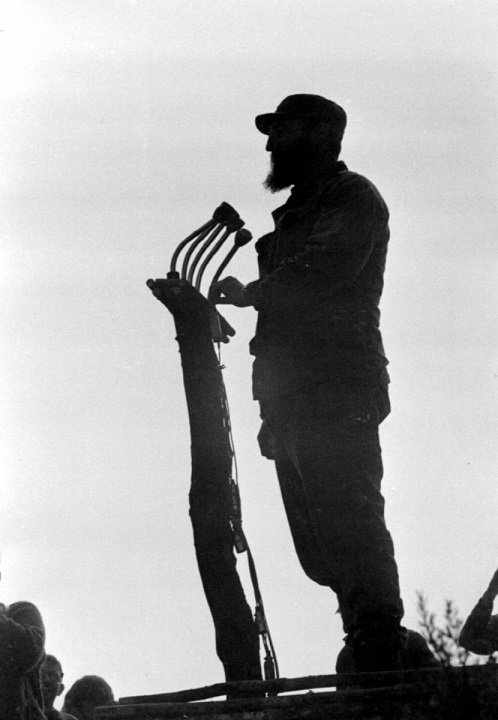
Fidel Castro turns ninety today—¡feliz cumpleaños! Jon Lee Anderson (The New Yorker) writes that Castro has relinquished control in Cuba, but still makes his presence felt. In his article “Ninety Years of Fidel Castro,” Anderson gives a summary of Castro’s trajectory.
Fidel Castro is turning ninety on Saturday. It has been a long life, and a most eventful one. He was born on August 13, 1926, three years before the Great Crash and the start of the global depression. Feature films were still silent; commercial air travel was in its infancy; most people who moved around the globe did so by ship; many navies still used sailing ships. The telephone existed, but for instant global communication and news, the telegram was still the thing. Most cars still had to be started with a hand crank.
Calvin Coolidge was the President of the United States, which at the time had a population of a hundred and seventeen million—a third of its present size—and there were forty-eight states. The United States was not a superpower. The country had few paved roads, and less than ten per cent of the rural population had access to electricity. A Sharia-style ban on the consumption of alcohol, known as Prohibition, had been in force since 1920 (and would last until 1933). Cuba had been an independent republic for a mere twenty-four years. It was the last of Spain’s colonies in the New World to be relinquished, but only after intervention by American forces, in 1898, had ended decades of bloody warfare with Cuban nationalists. Cuba had then fallen under U.S. military administration; it gained its independence in 1902, but only after it had agreed to have the so-called Platt Amendment embedded in its new constitution. This provision granted the U.S. control in perpetuity over Guantánamo Bay, as well as the right to intervene in Cuba whenever it saw fit. For decades thereafter, Cuba remained a virtual American colony, a period that Fidel has always referred to as the “pseudo-republica.” The U.S. Marines intervened repeatedly, and the Presidents were of the pliant variety.
Fidel, and his younger brother Raúl, grew up in Birán, then, as now, a provincial backwater of eastern Cuba, an area dominated in those days by carpetbagging U.S. agribusinesses like United Fruit, which had swooped in and bought up most of the productive land in the halcyon days that followed the Spanish-American War. [. . .]
By the time Fidel was sent to Havana for a private Jesuit education, and from there to Havana University, to study law, he had become an ardent nationalist, a fervent admirer of the country’s nineteenth-century national-independence hero, José Martí—a poet and journalist who had joined the war against the Spaniards and died heroically when he charged the enemy on horseback in his first day on the battlefield. He was an admirer of other historic men of action as well, including Robespierre, Julius Caesar, and Napoleon Bonaparte.
By the age of twenty-one, Fidel had begun to entertain political ambitions of his own, and was becoming known to Cuban authorities as a hothead with political aspirations and a penchant for the dramatic gesture. In 1947, he joined a boat expedition with other would-be revolutionaries planning to violently unseat the neighboring Dominican Republic’s dictator, Rafael Trujillo. [. . .]
By 1953, aged twenty-seven, Fidel’s ambition was no less than the seizure of power in Cuba, which by then was in the hands of an especially corrupt dictator, Fulgencio Batista. In July, he led a full-frontal assault with several fellow-armed youngsters against the Moncada army barracks in Cuba’s second city of Santiago. It was an unmitigated disaster. A number of rebels died in the fighting, and dozens more were executed, some after being brutally tortured. Fidel survived, and when he was put on trial he defended himself with an impassioned piece of oratory that took him four hours to read out, in which he declared, “History will absolve me.” He was convicted and sentenced to fifteen years in prison, but the proceedings solidified his position as a national figure. [. . .]
[PHOTOGRAPH BY GILBERTO ANTE / ROGER VIOLLET / GETTY]
For full article, see http://www.newyorker.com/news/daily-comment/ninety-years-of-fidel-castro
